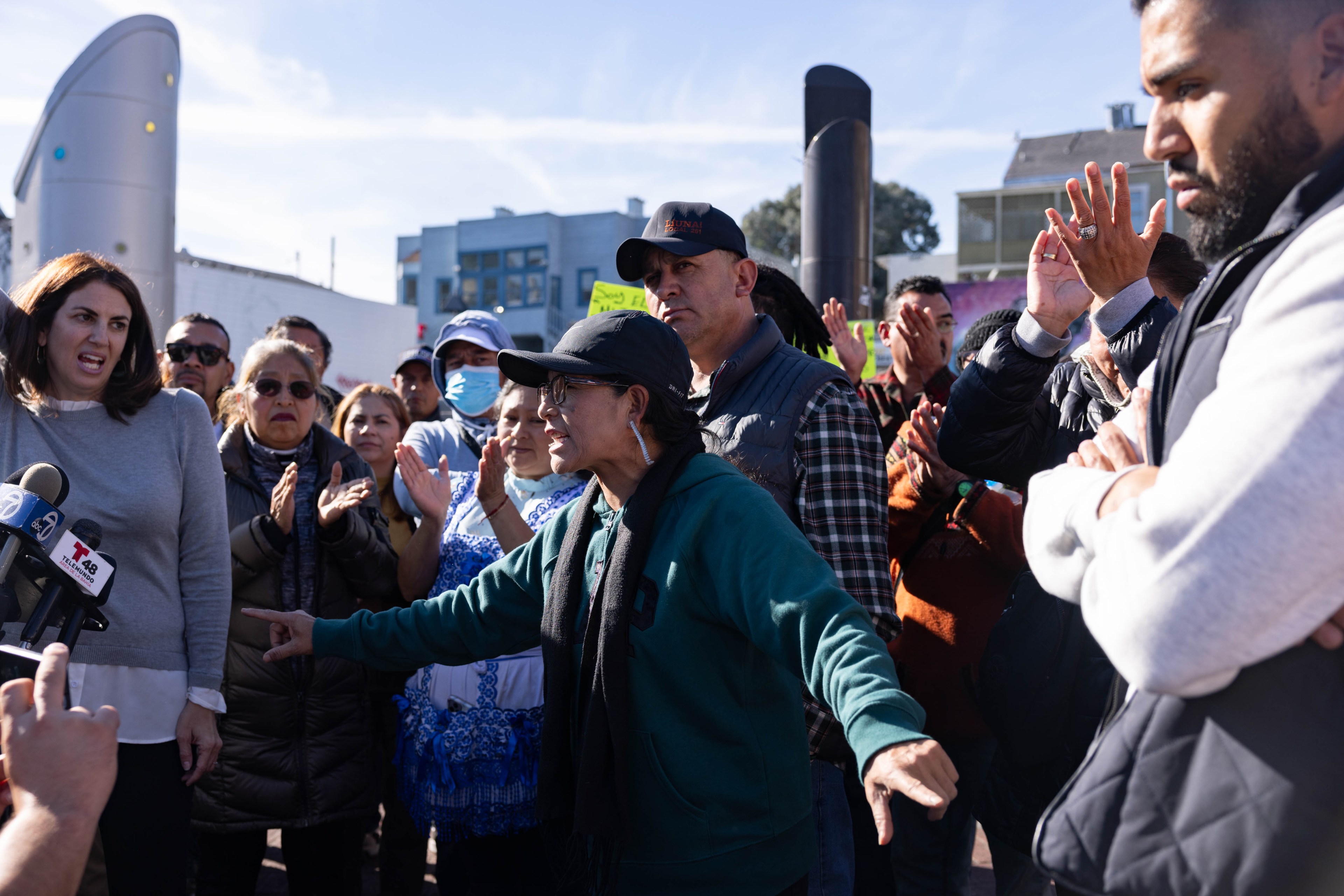Jose Barajas says he’s been selling flowers at the same place on Mission Street for 15 years: right outside the busy 24th Street BART station, where waves of commuters help power a business that pays his rent and supports a family of six.
But as of Monday, the 42-year-old’s business had effectively been shut down.
A 90-day ban on street vending on Mission and adjacent streets means even city-permitted sidewalk entrepreneurs like Barajas have to relocate their businesses or face fines of up to $1,000.
So instead of buckets of dahlias or sunflowers, Barajas’ table was empty, except for signs that read “90 days without work are 90 days without food. Thanks government,” and “I do not have work today because of San Francisco.”
Dozens of permitted vendors joined Barajas in protesting the ban on Monday, with many connecting it to the gentrification of the neighborhood and saying it was taking away their livelihoods on the eve of the holiday season. Residents can apply for permits to work on other streets outside of the unauthorized zone that spans down Mission Street, and 300 feet in either direction, but city officials said they didn’t know how long the process would take.
The permit costs $454 a year, but Rachel Gordon, a spokeswoman for the Department of Public Works, said Mission vendors’ fees had been waived. Food vendors are informally exempt from the ban, as officials consider those businesses as distinct from those who sell stolen goods.
The vendors around the busy BART stations on Mission have long been a fixture in the area, but officials say that an influx of unauthorized vendors who flaunt city rules and sell fenced goods has resulted in safety concerns.
After months of debate over the issue, Public Works, in consultation with the Mayor’s Office, police department and Supervisor Hillary Ronen, issued the 90-day ban on street vending in the area.
‘The Mission Is Our Heart’
On the first day of the prohibition, Mission Street was largely clear of vendors in the morning. A few had returned by the late afternoon, vendors said.
Public Works employees, in bright vests, ambled around the blocks adjacent to BART stations asking vendors to move as police officers looked on nearby. Two city employees, who declined to give their names, said that vendors had been packing up and moving without issue.
The city has rented commercial space for two indoor markets in the area, where vendors can have space for free over the duration of the ban. Neither were fully operational as of Monday midday as the sellers and city employees worked to get them running.
One of the locations, at 2137 Mission St., had 43 6-by-6-foot squares marked in tape on the floor as a DJ played dance music over speakers. Rodrigo Lopez, who has been selling tennis shoes, clothes and electronics on the street for the last year and a half, was one of many vendors who said the allotment was too small for all of his wares.
Lopez also said he was concerned about the lack of foot traffic into the space. Still, he joined others as part of an orientation for interested vendors at the space.
The issue is another example of how complicated public safety questions in San Francisco can be: Officials pointed to the murder of a vendor on the block last year amid rising crime statistics but acknowledged that the fix was not without collateral damage. Vendors will be given a yet-to-determined stipend to attend workforce training through the city.
Incident reports from the police and emergency services show an increase in the area between 16th and Mission and 25th and Mission in the two years since the pandemic, rising from 1,106 incidents in 2020 and 2021 to 1,287 in 2022 and 1,423 in 2023.
At the protest, many vendors said they felt unfairly punished for the actions of unpermitted vendors in the area. Others criticized the heavy police presence to enforce the ban, saying they had long asked for more support from the police to address crime and other issues in the area to little avail.
City officials say the police’s hands have been tied by a 2018 law that decriminalizes street vending across the state. Mayor London Breed released a statement on Monday that said she would work with state officials to amend the law to better allow police to intercede in cases involving stolen goods.
Officials also say their hand has been forced in part due to pressure from Public Works permit inspectors, some of whom have taken to wearing bulletproof vests on the job.
Gladys Maigua was one of many vendors who pleaded with Ronen to have the city delay the ban until January, describing how important holiday shopping in December was to vendors.
“The Mission is our heart,” she said to the supervisor, who listened as the vendors spoke.
After Ronen was invited to the microphone, she defended the city’s decision because of safety issues in the area and said that her office was going to study the ban closely to figure out what to do after it expires.
“Everything we’ve tried up until this point, and we’ve been trying for over a year, has not worked,” Ronen said.
